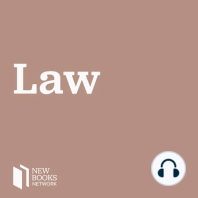69 min listen

Yuma Totani, “The Tokyo War Crimes Trials: The Pursuit of Justice in the Wake of World War II” (Harvard UP, 2008)
FromNew Books in Law
Yuma Totani, “The Tokyo War Crimes Trials: The Pursuit of Justice in the Wake of World War II” (Harvard UP, 2008)
FromNew Books in Law
ratings:
Length:
65 minutes
Released:
Apr 4, 2009
Format:
Podcast episode
Description
Most everyone has heard of the Nuremberg Trials. Popular books have been written about them. Hollywood made movies about them. Some of us can even name a few of the convicted (Hermann Goering, Albert Speer, etc.). But fewer of us know about what might be called “Nuremberg East,” that is, the Toyko trials held after the defeat of the Japanese in World War Two. These proceedings generated few books, no movies, and therefore occupy only a minor place in Western historical memory. Thanks to Yuma Totani’s excellent book, The Tokyo War Crimes Trials. The Pursuit of Justice in the Wake of World War II (Harvard, 2008; also available in Japanese here), that may change. We should hope it does, because the Tokyo trials were important. They not only helped the Japanese come to terms with what their government and military had done during the war (truth be told, they are still coming to terms with it today), but it also set precedents that are still being applied in international law today. More than that, Totani offers a challenging interpretation of the trials. They weren’t so much “victor’s justice” (the common interpretation in Japan) as a lost opportunity. Reading her book one can’t help but get the feeling that the Americans and their confederates bungled the trials badly. Instead of trying to establish personal responsibility in all cases, the Allies simply arrested the upper echelons of the Japanese civil and military elite and selected those who were “representative” for indictment. Those who were not indicted–though probably just as culpable as those who were–were set free, giving rise to the myth that they had brokered deals with the Americans. The prosecution was headed by an inattentive alcoholic (Joseph Keenan) who preferred interrogating the accused to gathering hard documentary evidence. The defense was comprised of ill-prepared Japanese attorneys and their less-than-helpful Allied aids. Confusion reigned in the courtroom. And of course there were significant translation problems throughout. The trials were something of a farce. I always wondered why many Japanese today don’t think very highly of the Tokyo proceedings. Now, thanks to Yuma Totani’s informative book, I have a better understanding of why.
Please become a fan of “New Books in History” on Facebook if you haven’t already.
Learn more about your ad choices. Visit megaphone.fm/adchoices
Support our show by becoming a premium member! https://newbooksnetwork.supportingcast.fm/law
Please become a fan of “New Books in History” on Facebook if you haven’t already.
Learn more about your ad choices. Visit megaphone.fm/adchoices
Support our show by becoming a premium member! https://newbooksnetwork.supportingcast.fm/law
Released:
Apr 4, 2009
Format:
Podcast episode
Titles in the series (100)
Charles Lane, “The Day Freedom Died: The Colfax Massacre, the Supreme Court, and the Betrayal of Reconstruction” (Henry Holt, 2008): Why did Reconstruction fail? Why didn’t the post-war Federal government protect the civil rights of the newly freed slaves? And why did it take Washington almost a century to intercede on the behalf of beleaguered, by New Books in Law